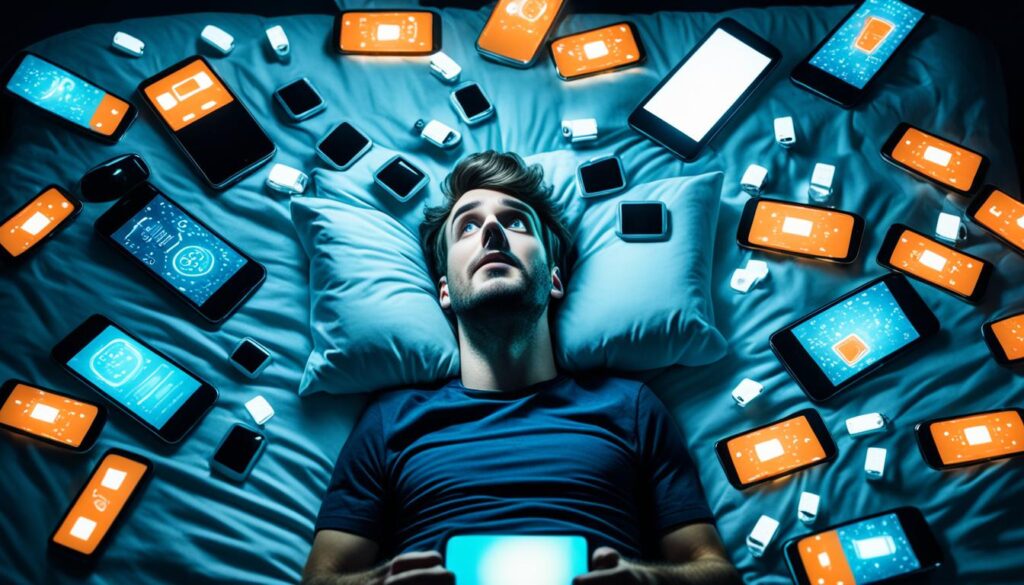Smartphones Revolutionize Our Lives—But At What Cost
Smartphones have undeniably revolutionized the way we live. These pocket-sized devices have transformed the way we communicate, navigate the world, and interact with others. From social media and instant messaging to the countless apps that make our lives more convenient, smartphones have become an integral part of modern society. But as we embrace this digital revolution, it’s crucial to question the cost of our smartphone dependency.
Are smartphones truly enhancing our lives, or are they leaving us more isolated and disconnected from the real world? What are the consequences of our technology addiction? Is our constant reliance on these devices impacting our mental health, relationships, and overall well-being?
In this article, we will explore the societal consequences of smartphone addiction and the risks associated with excessive smartphone use. We will delve into the impact of digital dependence on mobile devices and the potential consequences of our technology addiction. By understanding the effects of smartphones on society and taking steps to strike a healthy balance, we can navigate the digital landscape more effectively and preserve our well-being.
Key Takeaways:
- Smartphones have revolutionized the way we live, but at what cost?
- Excessive smartphone use can lead to diminished in-person interactions.
- Studies have shown that smartphone use can have a cognitive impact and affect our ability to focus.
- Smartphones have become external memory sources, altering the way we retain knowledge.
- Smartphone addiction can have significant societal costs, including the impact on relationships.
The Global Impact and Reach of Smartphone Technology
Smartphone technology has undergone a remarkable evolution from its early days as a simple communication device. Today, smartphones have become multi-functional devices that play a vital role in our lives. With features such as internet access, GPS navigation, cameras, and countless applications, smartphones have transformed the way we navigate the world and interact with others.
The rapid adoption rates of smartphones are a testament to their global impact. These devices have become ubiquitous, reaching every corner of the world. From urban centers to remote villages, smartphones have connected people in unprecedented ways, transcending geographical boundaries and bringing the world closer together. Their market saturation is a reflection of their indispensability in our daily routines.
The Evolution from Simple Communication to Multi-functional Devices
Originally designed for communication purposes, smartphones have evolved into powerful multi-functional devices that cater to various needs. These pocket-sized devices have become our portable companions, capable of performing tasks that were once exclusive to computers and specialized gadgets. With the touch of a screen, we can access information, capture moments, communicate with loved ones, and stay connected to the digital world.
Rapid Adoption Rates and Market Saturation
Smartphones have witnessed staggering adoption rates around the globe. People from diverse backgrounds, cultures, and age groups have embraced these devices as essential tools for daily life. This widespread adoption has led to market saturation, with smartphones becoming an integral part of our society.
Smartphones Top “101 Gadgets That Changed the World”
The impact of smartphones on society is undeniable. These devices have revolutionized the way we live, work, and interact. In recognition of their influence, smartphones have secured their place in the prestigious list of “101 Gadgets That Changed the World.” This acknowledgment emphasizes their transformative role in shaping our present and future.
| Smartphone Revolution | Consequences |
|---|---|
| Global impact of smartphone technology | Influence on various aspects of life |
| Rapid adoption rates | Saturation of smartphones in the market |
| Recognition as a game-changing gadget | Transformation of society and daily routines |
| Drawbacks of excessive smartphone usage | Negative effects of screen time and dependency |
A Double-Edged Sword: The Convenience and Dependency of Smartphones

Smartphones have become an integral part of our lives, offering convenience, connectivity, and access to a wealth of information. However, this convenience comes at a cost. Smartphones’ constant connectivity has a negative impact on our mental health and well-being because it can cause dependency and addiction.
Excessive smartphone usage has been linked to a range of negative effects, including increased anxiety, depression, and sleep disturbances. It can also affect our relationships, as we become more absorbed in our digital lives and less present in our personal interactions.
As we navigate the digital landscape, it is crucial to prioritize our digital well-being and find a balance between technology and our mental health. Taking breaks from our smartphones, setting boundaries for device usage, and engaging in activities that promote mental well-being can help mitigate the negative consequences of smartphone addiction.
Building and maintaining healthy relationships in the age of technology is also important. This involves being fully present during face-to-face interactions and fostering meaningful connections that go beyond the virtual realm. By prioritizing our mental health and relationships while using smartphones responsibly, we can navigate the double-edged sword of convenience and dependency, ensuring a healthier relationship with technology.
“The convenience of constant connectivity can lead to dependency and addiction.”
Smartphones Revolutionize Our Lives—But At What Cost?
As smartphones continue to revolutionize our lives, it’s important to examine the potential drawbacks and costs associated with these devices. A decline in in-person interactions and a shift towards a more device-focused society are the results of smartphones’ constant connectivity.
The Price of Constant Connectivity: Diminished In-person Interactions
The widespread use of smartphones has led to a decrease in meaningful face-to-face interactions. People are often more engaged with their devices than with the people around them, causing a disconnect from the real world. This constant connectivity means that individuals may miss out on important social cues and the opportunity for genuine human connection.
Smartphone Use and Cognitive Impact: Studies Show Reduced Focus
Research has shown that excessive smartphone use can have a negative impact on our cognitive abilities. Constant exposure to digital technology can result in reduced ability to focus and concentrate, leading to distractions and decreased productivity. As we become reliant on smartphones and the constant stimulation they provide, our ability to concentrate on tasks at hand may suffer.
“External Memory Source”: Internet-Connected Intelligence
Smartphones have become external memory sources, allowing users to quickly access information through the internet. While this can be convenient, it raises concerns about privacy and the erosion of our own knowledge and memory. Instead of retaining information, we rely on smartphones as a crutch, potentially hindering our cognitive abilities and critical thinking skills.
In conclusion, while smartphones have revolutionized our lives in many ways, it’s important to consider the potential costs and drawbacks of constant connectivity and dependency on these devices. The decline in in-person interactions, cognitive impact, and reliance on smartphones as external memory sources raise concerns about privacy, cognitive abilities, and the influence of smartphones on personal relationships. As we navigate the digital age, finding a balance between the benefits of smartphones and the costs they may incur is crucial for maintaining our well-being and meaningful connections.
Navigating the Digital Ecosystem: Are Smartphones Making Us More Human?

As smartphones become an essential part of our daily lives, we must question whether they are making us more human or distancing us from our true essence. The negative impacts of excessive smartphone usage on mental health and social interactions are prevalent. The rise of digital addiction and the influence of digital technology on our lives raise concerns about the impact of smartphones on our overall well-being. It is vital to navigate and balance the digital ecosystem to preserve our humanity.
Smartphones, with their constant connectivity and the allure of social media, have transformed the way we interact with the world. However, this advancement has come at a cost. Studies have shown that excessive smartphone usage can lead to a range of negative impacts on our mental health, including increased feelings of loneliness, anxiety, and depression. The constant pressure to be connected and the addictive nature of smartphones can take a toll on our overall well-being.
In addition to the impact on mental health, the influence of digital technology on our lives has raised concerns about the erosion of genuine human connection. Social media, while allowing us to connect with others on a global scale, can also create a sense of superficiality and disconnection. The curated nature of online profiles and their constant comparison to others’ highlight reels can negatively impact our self-esteem and sense of worth.
Furthermore, the addictive nature of smartphones and the constant need for validation through likes and comments can lead to a cycle of seeking external validation for self-worth. This dependence on digital interactions can hinder our ability to develop authentic relationships and meaningful connections in the real world.
As we continue to navigate the digital ecosystem, it is important to be mindful of our smartphone usage and its impact on our well-being and relationships. Finding a balance between technology and human connection is crucial. Taking regular breaks from smartphones, engaging in activities that promote in-person interactions, and practicing digital detoxes can help restore a sense of authenticity and connection.
The negative impacts of excessive smartphone usage:
- Increased feelings of loneliness, anxiety, and depression
- Superficial connections and comparison culture
- Addictive behaviors and dependency
- Erosion of genuine human connection and relationships
- Validation-seeking through digital interactions
By understanding the consequences of excessive smartphone usage and actively working to mitigate its negative impacts, we can strive for a healthier relationship with technology and embrace our true human essence.
| Negative Impact of Smartphones on Mental Health | Social Media Impact on Relationships |
|---|---|
| Increased feelings of loneliness, anxiety, and depression | Superficial connections and comparison culture |
| Addictive behaviors and dependency | Erosion of genuine human connection and relationships |
| Validation-seeking through digital interactions |
Smartphones as Digital Extensions of Ourself: A New Form of Symbiosis
Smartphones have become more than just devices; they have become extensions of ourselves. We form psychological attachments to our smartphones, relying on them for various aspects of our life. Whether it’s staying connected with loved ones, accessing information, or managing daily tasks, smartphones have become indispensable companions.
With their ubiquity and technological advancements, smartphones have reshaped our memory and social habits. We no longer rely solely on our internal memory. Instead, we turn to our smartphones as an external memory source, storing vast amounts of information at our fingertips. This reliance on smartphones for information retrieval has altered the way we remember and process knowledge.
Moreover, smartphones have transformed how we interact with others. Social media platforms allow us to effortlessly connect with friends, family, and even strangers across the globe. However, this hyperconnectivity has both positive and negative consequences. While it enables us to maintain relationships and create new connections, it can also lead to shallow interactions and a sense of digital disconnection.
In this age of hyperconnectivity, being constantly connected has become the new norm. It has blurred the boundaries between our online and offline lives, making it challenging to disconnect and find moments of solitude. We find ourselves caught in a state of perpetual connectedness, always reachable and available.
As smartphones continue to evolve, our relationship with them becomes increasingly intertwined. We rely on them for communication, information, entertainment, and even personal well-being. But as we embrace this digital symbiosis, it’s crucial to reflect on the consequences of our dependence on smartphones and ensure a healthy balance between technology and human connection.
The Societal Costs of Smartphone Addiction

In today’s digital age, the widespread addiction to smartphones has significant societal costs. As these devices become increasingly integrated into every aspect of our lives, their influence on society and personal relationships requires careful consideration and awareness. Emerging smartphone behaviors, such as excessive screen time and constant connectivity, have a profound impact on relationships and daily interactions.
The Impact of Emerging Smartphone Behaviors on Relationships
Smartphones have transformed the way we connect and communicate with one another. However, the constant presence of smartphones can lead to a reliance on virtual interactions at the expense of genuine face-to-face connections. Excessive smartphone usage can create a sense of detachment, diminishing the quality of personal relationships and eroding the foundation of meaningful interactions.
Research has shown that excessive screen time on smartphones can lead to feelings of isolation, social anxiety, and reduced empathy. When individuals prioritize their virtual lives over real-life interactions, the emotional depth and intimacy of relationships are compromised. The addictive nature of smartphones can also cause individuals to neglect their partners, friends, and family members, leading to feelings of neglect and alienation.
Furthermore, smartphones have become a source of distraction during social gatherings and intimate moments. Constantly checking of notifications, scrolling through social media feeds, and prioritizing virtual engagements over personal interactions can create a barrier to real connection. The presence of smartphones in intimate settings can interrupt conversations, distract from shared experiences, and hinder the development of interpersonal bonds.
Smartphone Intrusion in Intimate Settings: A Barrier to Real Connection
In the era of smartphones, privacy has become a scarce commodity. These devices have the potential to intrude upon intimate settings, compromising personal boundaries and hindering genuine connections. For example, the constant access to personal information and social media platforms through smartphones can lead to jealousy, mistrust, and insecurity within relationships.
Smartphones also contribute to the blurring of public and private spaces. The intrusion of notifications, messages, or phone calls can easily disrupt private moments or confidential conversations. This intrusion not only disrupts the flow of interaction but also dampens the sense of privacy and vulnerability that is crucial for fostering deep connections.
To cultivate healthy relationships, it is crucial to establish boundaries and prioritize real-world interactions over virtual engagements. Engaging in open and honest conversations about smartphone usage within relationships can help create a mutually agreed-upon balance that respects the needs and desires of both partners.
The Risks of Smartphone Dependency on Relationships
| Challenges | Impact on Relationships |
|---|---|
| Excessive screen time | Diminished in-person connections, decreased quality of interaction |
| Virtual prioritization | Feelings of neglect, emotional detachment, and reduced intimacy |
| Smartphone intrusion in intimate settings | Loss of privacy, disruption of personal boundaries, hindered vulnerability |
| Jealousy and mistrust | Compromised trust within relationships due to easy access to personal information |
Technology’s Challenges and the Road Ahead: Balancing the Digital with the Real
In today’s digital age, smartphones and technology have become an integral part of our lives. While these advancements bring convenience and connectivity, they also present challenges that need to be addressed. Finding a balance between the digital world and the real world is crucial for our well-being and overall satisfaction. As we navigate the impact of smartphones and technology, it is important to develop healthy habits to maintain a healthy relationship with these devices.
Developing Healthy Habits in an Always-On Culture
Living in an always-on culture with constant digital connectivity can take a toll on our mental health. It is essential to establish boundaries and create healthy habits around smartphone usage. Setting limits on screen time, designating technology-free periods, and prioritizing offline activities can help us maintain a healthy balance. By being mindful of our smartphone usage, we can prevent digital dependence and ensure that technology serves us instead of controlling us.
The Role of Mindfulness and Digital Well-being in the Smartphone Era
Mindfulness and digital well-being practices are valuable tools in navigating the challenges posed by smartphones. By practicing mindfulness, we can become more aware of our smartphone usage patterns and make conscious choices about when and how we engage with our devices. Digital well-being features offered by smartphone manufacturers, such as screen time tracking and app limits, can also support our efforts to create a healthier relationship with technology. Embracing these practices allows us to use smartphones with intention, promoting a more balanced and fulfilling life.
Living with Technology Without Surrendering to It: Expert Insights
Experts offer valuable insights on how to maintain a healthy relationship with smartphones and technology. Their guidance can help us navigate the challenges that arise from our increasing reliance on digital devices. From setting boundaries to finding alternative activities, experts suggest various strategies to ensure that we live with technology without surrendering to its negative impacts. By incorporating their wisdom into our lives, we can harness the benefits of smartphones while mitigating the potential consequences.
In conclusion, while smartphones have revolutionized our lives, we must be mindful of the costs and consequences associated with their excessive usage. Striking a balance between the digital and real worlds is essential for our well-being and relationships. By developing healthy habits, practicing mindfulness, and seeking expert insights, we can navigate the challenges of living in a smartphone era and embrace the benefits while minimizing the potential drawbacks.

Leave a Reply